

Dashboards. COVID-19 vaccines likely activate strong, lasting immunity. Share this Article You are free to share this article under the Attribution 4.0 International license.
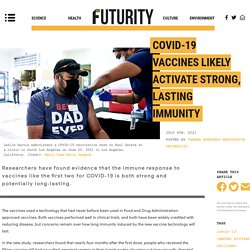
Researchers have found evidence that the immune response to vaccines like the first two for COVID-19 is both strong and potentially long-lasting. The vaccines used a technology that had never before been used in Food and Drug Administration-approved vaccines. Both vaccines performed well in clinical trials, and both have been widely credited with reducing disease, but concerns remain over how long immunity induced by the new vaccine technology will last. In the new study, researchers found that nearly four months after the first dose, people who received the Pfizer vaccine still had so-called germinal centers in their lymph nodes churning out immune cells directed against SARS-CoV-2, the virus that causes COVID-19. ‘Truly remarkable’ findings In April, both Pfizer and Moderna reported that their vaccines provided at least six months of protection. Past coronavirus 'memories' may explain mild COVID. Share this Article You are free to share this article under the Attribution 4.0 International license.
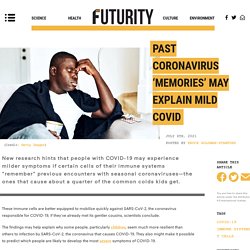
New research hints that people with COVID-19 may experience milder symptoms if certain cells of their immune systems “remember” previous encounters with seasonal coronaviruses—the ones that cause about a quarter of the common colds kids get. These immune cells are better equipped to mobilize quickly against SARS-CoV-2, the coronavirus responsible for COVID-19, if they’ve already met its gentler cousins, scientists conclude. The findings may help explain why some people, particularly children, seem much more resilient than others to infection by SARS-CoV-2, the coronavirus that causes COVID-19. They also might make it possible to predict which people are likely to develop the most severe symptoms of COVID-19. News Republic. Show captions Showing image 1 of 1 Reuters.
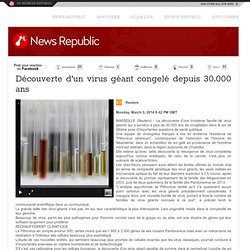
News Republic. Monday, March 3, 2014 8:39 PM GMT Il attendait depuis 32 000 ans dans les profondeurs sibériennes.
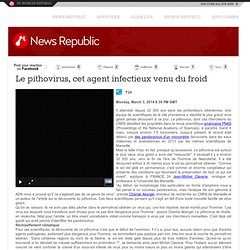
Une équipe de scientifiques de la cité phocéenne a identifié le plus grand virus géant jamais découvert à ce jour. Le pithovirus, dont ces chercheurs du CNRS détaillent les propriétés dans la revue scientifique américaine PNAS (Proceedings of the National Academy of Sciences), à paraître mardi 4 mars, mesure environ 1,5 micromètre. Jusqu'à présent, le record était détenu par des pandoravirus d'un micromètre découverts dans les eaux chiliennes et australiennes en 2013 par les mêmes scientifiques de Marseille. Mais la taille n'est, en fait, presque qu'accessoire. “Au début, sa morphologie très particulière en forme d'amphore nous a fait pensé à un nouveau pandoravirus, mais l'analyse de son génome à ADN nous a prouvé qu'il ne s'agissait pas de ce genre de virus”, précise Chantal Abergel, directeur de recherche au CNRS de Marseille et co-auteur de l'article sur la découverte du pithovirus.
The Selling of ADHD: Diagnoses, Prescriptions Soar After 20-Year Marketing Effort by Big Pharma. This is a rush transcript.
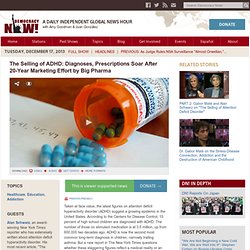
Copy may not be in its final form. AMY GOODMAN: Taken at face value, the latest figures on attention deficit hyperactivity disorder, ADHD, suggest a growing epidemic in the United States. According to the Centers for Disease Control, 15 percent of high school children are diagnosed with ADHD. The number of those on stimulant medication is at 3.5 million, up from 600,000 two decades ago. ADHD is now the second most common long-term diagnosis in children, narrowly trailing asthma.
But a new report in The New York Times questions whether these staggering figures reflect a medical reality or an over-medicated craze that has earned billions in profits for the pharmaceutical companies involved. The marketing effort has relied on studies and testimonials from a select group of doctors who have received massive speaking fees and funding grants from major pharmaceutical companies. Well, to discuss this issue, we’re joined by four guests.
Dr. JOHN EDWARDS: Good morning. Are we running out of Antibiodics? By Agence France-PresseSunday, January 19, 2014 10:15 EDT Humans face the very real risk of a future without antibiotics, a world of plummeting life expectancy where people die from diseases easily treatable today, scientists say.

Experts tracking the rise of drug resistance say years of health gains could be rolled back by mutating microbes that make illnesses more difficult and expensive to cure and carry a higher risk of death. Some say the threat to wellbeing is on the scale of global warming or terrorism — yet resistance is being allowed to spread through an entirely preventable means — improper use of antibiotics. “It is a major public health problem,” Patrice Courvalin, who heads the Antibacterial Agents Unit of France’s Pasteur Institute, told AFP.
“It is about more than not being able to treat a disease. Bayer and US Government Knowingly Gave HIV to Thousands of Children. What if a company that you thought you could trust, knowingly sold you a medicine for your child that they knew had the potential to give your child HIV?
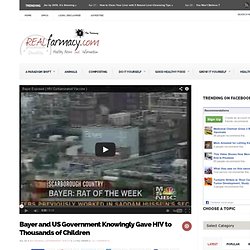
How would you react? What if a government agency that claims the responsibility for protecting you from such treachery, not only looked the other way, but was complicit in this exchange? Everyone has heard of Bayer aspirin, it is a household name. Bayer AG also manufactures numerous other products, from pesticides to medicine for hemophiliacs called Factor 8.
In 1984 Bayer became aware that several batches of this Factor 8 contained HIV. Otra Medicina - Medicina Alternativa y Plantas Medicinales.